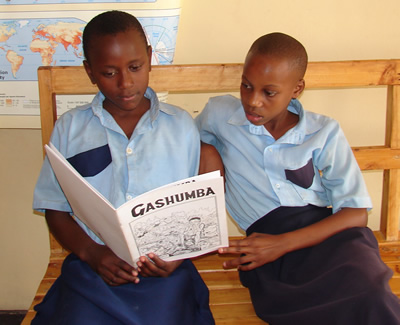I knew I was dealing with a special group of university students when all the students arrived at least 15 minutes early for their interviews. By the end of the day, I was so impressed with all of the students that I had interviewed, that it was very difficult to select just five for the available focus group technician positions.
Over the coming months we will be learning more about programming and book needs in the Rwinkwavu community by running a series of focus groups. Simon Mvunabandi, our fantastic Orphans of Rwanda (ORI) intern, and I will be working with a team of five other ORI scholars to conduct the groups. ORI provides university tuition, housing, healthcare, counselling and supplementary training including extensive language training to over 180 orphans and other vulnerable young Rwandans. We are very excited to be working with ORI on this project.
One week after the interviews, Console, Diane, Justine, Tharcisse, Yassin, Simon and I met for a training session. Things started with an explanation of the focus group concept and then moved into specific tools needed to lead effective focus group sessions. Throughout the training session, I continued to be impressed with the ORI students’ enthusiasm for the project. When we ran practice sessions with the questions Simon and I had developed, the students’ input was invaluable.

ORI students running a practice focus group
The focus groups will allow us to hear from community leaders, primary students, health care professionals, teachers, grandparents, social workers and other community groups over the course of several weeks. Working with the ORI students enables us to conduct the groups in Kinyarwanda. This, we hope, will create a comfortable environment that will make communication relaxed and the sharing of ideas easy. It will also ensure that we hear from community members who don’t have a voice in English or French. These groups stand to benefit tremendously from the center, and it is important that we hear from them. I can hardly wait!!
Katie Uher






 Pascaline Beza, Age 13
My favourite book is called Breaking the Silence, I’ve read it five times! It’s about HIV/AIDS. The library has helped me learn how I can protect myself from getting HIV/AIDS and other diseases.
Pascaline Beza, Age 13
My favourite book is called Breaking the Silence, I’ve read it five times! It’s about HIV/AIDS. The library has helped me learn how I can protect myself from getting HIV/AIDS and other diseases.
 Angelique Niyonkuru, Age 12
The library is full of interesting stories and there are even dictionaries for difficult words. I get to learn many stories that I didn’t know before the library was built. Reading makes me feel happy, and when I tell other people the new stories, they can feel happy too.
Angelique Niyonkuru, Age 12
The library is full of interesting stories and there are even dictionaries for difficult words. I get to learn many stories that I didn’t know before the library was built. Reading makes me feel happy, and when I tell other people the new stories, they can feel happy too.
 Odila Dusube, Age 13
I like going to the library and finding extra information about what my teachers have told me in class. It is so interesting to learn about the everyday life of other people in countries outside of Rwanda.
Odila Dusube, Age 13
I like going to the library and finding extra information about what my teachers have told me in class. It is so interesting to learn about the everyday life of other people in countries outside of Rwanda.
 John Bosco Nshimiyimana, Age 24
Before the library opened I had not read any books besides textbooks. We don’t have any books at home. Reading helps me to not make mistakes in my writing. It helps me understand the world around me, especially geography. I’m very happy with the library, it increases my knowledge.
John Bosco Nshimiyimana, Age 24
Before the library opened I had not read any books besides textbooks. We don’t have any books at home. Reading helps me to not make mistakes in my writing. It helps me understand the world around me, especially geography. I’m very happy with the library, it increases my knowledge.